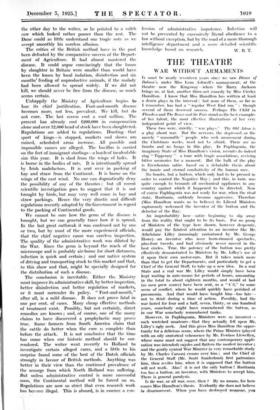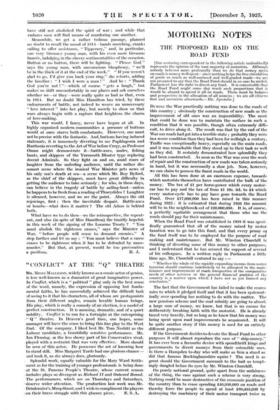. THE THEATRE
WAR WITHOUT ARMAMENTS
IT must be nearly seventeen years since we saw Diana of Dobson's, under Miss Lena Ashwell's management, at the theatre—now the Kingsway—where Sir. Barry Jackson
brings us, at last, another three-act comedy by Miss Ciceley Hamilton. I know that Miss Hamilton has written at least a dozen plays in the interval ; but none of them, so far as
I remember, has had a " regular West End run " though several of them deserved success. Perhaps The Child in Flanders and The Brave and the Fair stand as the best examples of her talent, the most effective illustrations of her very independent point. of view. - These two were, strictly, " war plays." The Old Adam is a play about war. But the nervous, the depressed, or the
merely " seasonable " people, who seek amusement during the Christmas weeks, need not Le afraid. There are no bombs and no bangs in this play. In Paphlagonia, the
imaginary State of Miss Hamilton's vision, recruits do indeed sing " Tipperary ''— a tune with tragic associations, reviving bitter memories for a moment. But the 'bulk of the play is Ercwhonian satires based on a debatable thesis about the innate and eternal combativity of the human race.
No bombs, but a button, which only had to be pressed in order to control the Negative Ray ; and this, in turn, was quite enough to benumb all mechanical appliances in any country against which it happened to be directed. Now of course Paphlagonia was not ready for war, when the rival state, Ruritania, suddenly became aggressive. Therefore (Miss Hamilton wants us to believe) its Liberal Ministers rapturously welcomed the inventor of the button and the detector of the Ray.
An improbability here --satire beginning to slip away from the reality that ought to be its basis. For no group of Ministers of the type here shown, however desperate,
would pay the faintest attention to an inventor like Mr. Athelstane Lilley (amusingly caricatured by Mr. George
Howe)—an inventor who wore horn-rimmed spectacles, plus-four tweeds, and had obviously never moved in the best circles. True, the potency of the button was pretty effectively demonstrated to Ministers by Mr. Lilley's use Of it upon their own motor-cars. But it takes much more than that to get' the Departments, and particularly to get a Chief of the General Staff, to take up a new idea. In a real State and a real war Mr. Lilley would simply have been kept waiting in ante-rooms for periods of hours, amounting in the total to about eighteen months, and would at last (as men grew scarce) have been .sent, as a " C 8," to some scene of conflict, where he would quickly have perished of
pneumonia. And that would have taught him—too late— not to think during n time of action. -Possibly, had • the war lasted for four and a half, seven. thirty, or one hundred years, somebody might have remembered the button, as in our War somebody remembered tanks.
However, in Paphlagonia, Ministers were so incorrect-- such wretched amateurs—that they actually fell upon Mr.
Lilley's ugly neck. And this gives Miss Hamilton the oppor- tunity for a deliciouS scene, wheic the Prime Minister (played with an oily oratorical vehemence by Mr. Fcwlass
whose name must not suggest that any contemporary appli- cation was intended) cajoles and flatters the modest inventor ; and the gently cynical War Minister (a very remarkable study by Mr. Charles Carson) croons over him ; and the Chief of the General Staff (Mr. Scott Sunderland) first patronizes him, then reviles him, when it is supposed that the button will not work. Alas! it is not the only button ! Ruritania too has a button, an inventor, with Ministers to accept him. There is general paralysis.
Is the war, Or all war, over, then ? By no means, for here comes Miss Hamilton's thesis. Evidently she does not believe in disarmament. When you have destroyed weapons, you
have still not abolished the spirit of war ; and while that endures men will find means of murdering one another.
Meanwhile, we get a rather tedious passage, planned no doubt to recall the mood of 1914—bands marching, cranks calling to offer assistance, Tipperary," and, in particular, one very tiresome young man, with his even more tiresome fiancee, indulging in the cheery sentimentalities of the occasion. Button or no button, there will he fighting. " Please God," says the young man, with unconscious blasphemy, " we'll be in the thick of it at the end of the week." " If you weren't glad to go, I'd give you back your ring," she retorts, adding the familiar : " I wish I were a man ! " And he : " Thank God you're not ! "—which of course " gets a laugh," but makes us shift uncomfortably in our places and ask ourselves whether we—or they—were really quite as bad as that, even in 1914. But no doubt Miss Hamilton has tried, by these endearments of battle, not indeed to weave an unnecessary " love interest " into her play, but merely to show us that wars always begin with a rapture that heightens the charm of love-making.
This war would, I fancy, never have begun at all. In highly organized modern communities a pressure of buttons would at once starve both combatants. However, one must not be precise with the fantastic. And, buttons having induced stalemate, it is immensely diverting to see Paphla,gonia and Ruritania reverting to the Art of War before Crecy, as Professor Oman might demonstrate it—battle-axes, mules, fishing boats, and skippers of the Yarmouth Bloater type replacing decent Admirals. So they fight on and on, amid roars of laughter from the unfeeling audience, until the rather dis- sonant scene where the ironical War Minister gets news of his only son's death at sea—a scene which Mr. Roy Byford, as the chief of the skippers, must have great difficulty in getting the audience to take seriously ; for who, in these days, can believe in the tragedy of battle by sailing-boat—unless he happens to be fresh from a reading of Thucydides ? Laughter is silenced, however, and we see the point. Always the old rejoicings, first ; then the inevitable despair. Battle-axes or bombs—what does it matter ? The old Adam is behind both.
What have we to do then—we the retrospective, the repent- ant, and also (in spite of Miss Hamilton) the timidly hopeful, in this week of the signing of the Locarno Treaty ? " You must abolish the righteous causes," says the Minister of War, " before people will cease to demand enemies." A step further and let us say : " You must believe that a cause ceases to be righteous when it has to be defended by mass- murder." But that, at present, would be too provocative



































































 Previous page
Previous page